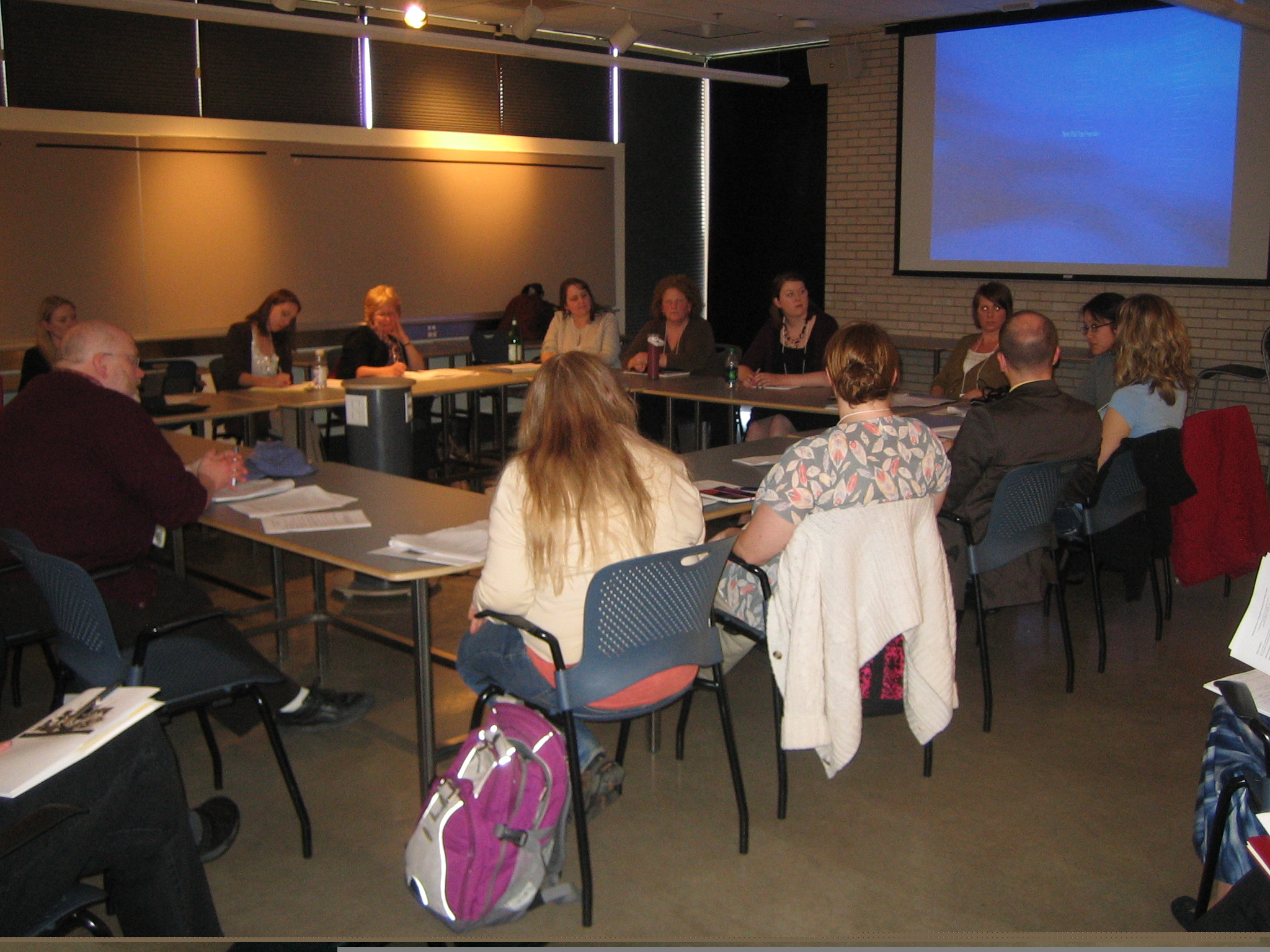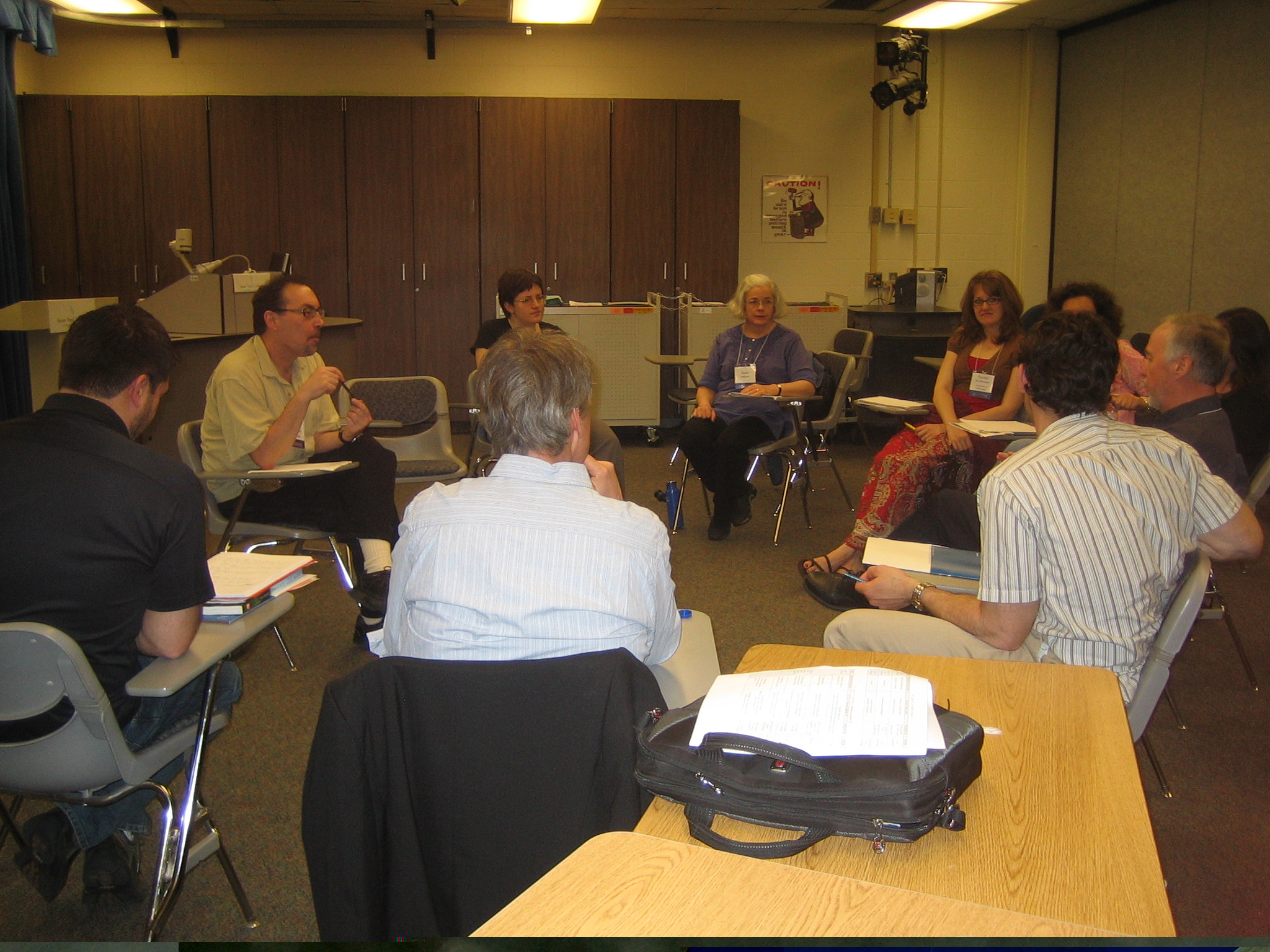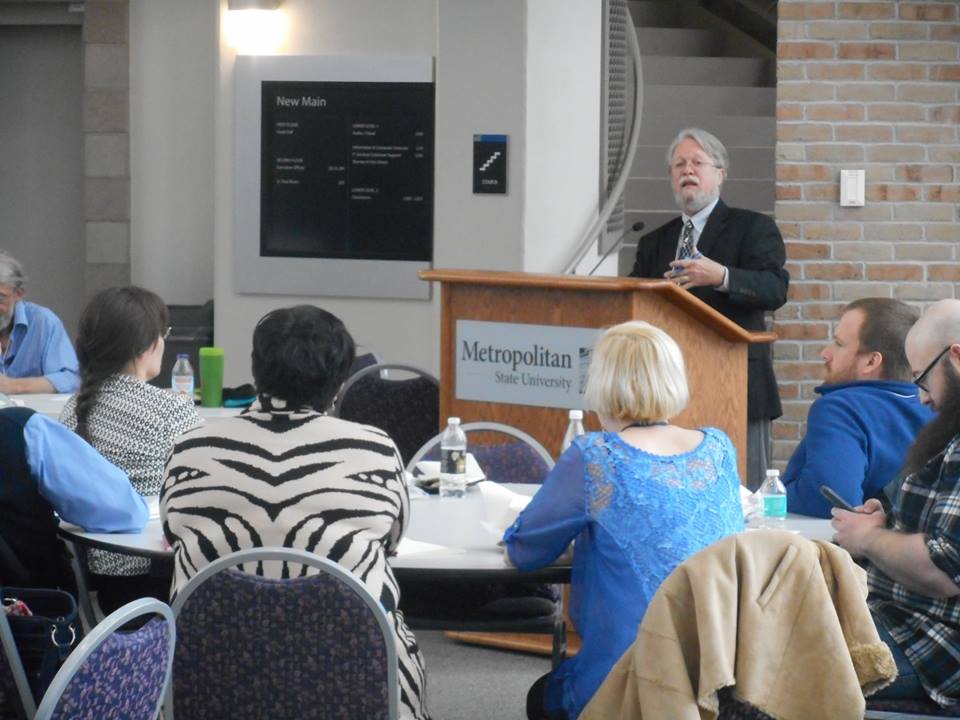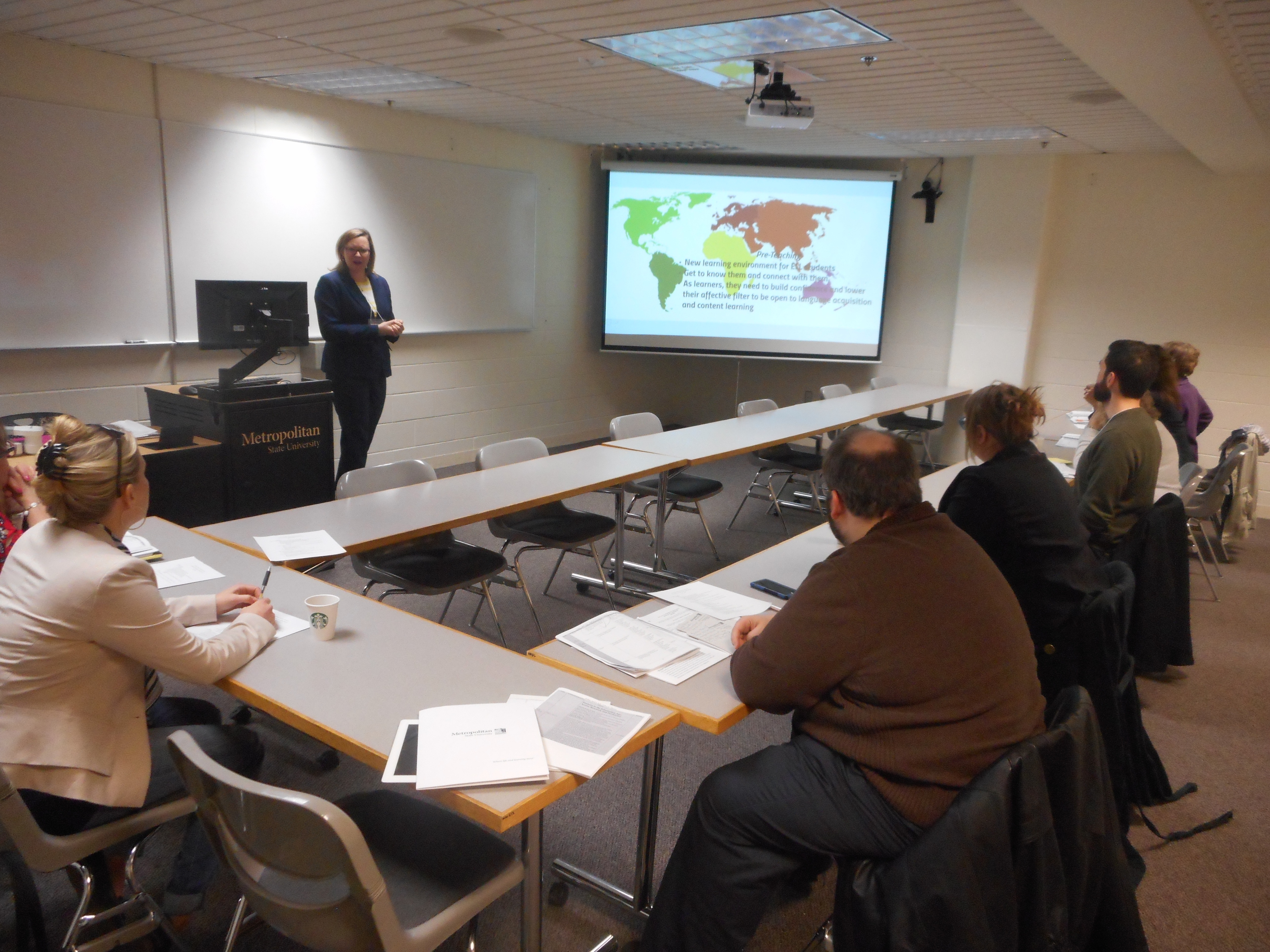|
“MnWE News”
Early Fall Issue,
September-October 2018
In this issue:
1. IS
YOUR WORK
VALUABLE?
2.
NEW CFP:
2nd
CHANCE TO
PRESENT DURING
CCCC (Deadline:
Nov. 1)
3.
METHODS: ARE WE READY FOR
GENERATION Z?
4. 2019
MnWE CONF. APRIL
5-6: HOW DO WE
TEACH AND USE
READING?
5. About
MnWE:
Forwarding the
News,
Joining/Leaving,
Grad Credit,
Representatives
If you are a
MnWE
representative,
please forward
this email to
colleagues in
English,
Writing and
related fields.
Many new faculty
and writing
tutors may not
be on the email
list.
If you are a
long-term member
of this
listserv, thank
you
for your
continued
participation.
If you are new,
welcome! Our
listserv emails
go to about 2500
English,
Writing, and
related Upper
Midwest faculty.
To join, send a
request to the
editor at
richard at
jewell dot net.
Our website is
www.MnWE.org.
Our next
conference is on
“Connecting
Reading and
Writing” at
North Hennepin
Community
College
Fri.-Sat., April
5-6, 2018. You
are welcome to
attend our next
Committee
meeting at UM-TC
in Nicholson 235
on Fri., Nov. 9,
or Skype it at
https://join.skype.com/yX9xIb6Icx8L.
–
Richard Jewell,
Editor
1.
IS YOUR WORK
VALUABLE?
Thank
you for the work
that you do.
Even if you
sometimes
receive thanks
from students,
you still do not
hear “thanks”
often enough.
Every time one
of us reaches a
student in a
small way, that
student is
likely to
directly affect,
with what she or
he has learned
from you, at
least several
other people per
year during the
student’s
lifetime: at
least 200 other
people over the
years. How many
students do you
have each year,
perhaps 200? If
so, that means
there will be
40,000 people
per year whom
you will affect,
in at least
small ways,
during your
students’
lifetimes.
What if those
40,000 people
per year are
counted in each
year of your
estimated
30-year career?
Your teaching,
through your
students, may
then eventually
reach over 1
million people
in–at the
least–small
ways. That is
big. And that’s
just the small
stuff.
You
matter. We
matter. The work
we do is of
great
importance, in
ways both big
and small. And
all of the work
we do together
is a giant,
rich, and
complex
web–mental,
emotional, and
physical/digital–that
spreads through
your
communities,
into your
states, and far
beyond. We
should all
remember how
great, how
important in the
long run, the
work we do
becomes.
---
2.
NEW CFP:
2nd CHANCE TO
PRESENT DURING
CCCC (Deadline:
Nov. 1)
Would
you like to
present during
CCCC in
Pittsburgh in
March? The
deadline has
long since
passed for
regular
proposals.
However, you
have an
opportunity to
make a
new/additional
proposal for the
new, jointly
held TYCA
National
Conference. TYCA
(Two-Year
College
Association of
English) is
holding its
first-ever
national
conference on
March 13 with
and during CCCC.
TYCA will accept
proposals until
November 1.
Anyone
(at two-year
college or not)
may make a
proposal, but
the focus should
be helpful in
some way to
two-year college
teaching of
English/Writing
and related
disciplines.
This is an
especially good
opportunity for
newer part- and
full-time
faculty at all
levels, for
graduate
students, and
for two-year
college faculty
who have
something
helpful to say
to a national
gathering.
---
CFP:
http://www2.ncte.org/groups/tyca/2019-tyca-conference-call-proposals/
---
3. METHODS: ARE YOU READY
FOR GENERATION
Z?
Generation
Z is upon us.
Born about
1995-2012, Gen
Zers now are our
undergraduate
students and
will be for
another decade.
A research study
by Barnes and
Noble
College–and a
summary of it in
Forbes
online–well
describes these
students. They
have three
primary college
learning traits:
(1) a majority
wants hands-on
learning, (2)
most have been
immersed in
integrated
technology all
their lives and
expect college
educations to
provide the
same, and (3) of
Gen Z middle-
and high-schoolers
almost 90%
considers
college
necessary and
has more career
focus than
earlier college
generations.
About
50% wants
hands-on
learning in and
out of the
classroom, and
only 12% wants
lectures. These
students also
seek to
integrate
in-class and
extracurricular
experiences for
better learning.
In addition,
they want their
courses not only
to use
technology but
to integrate a
variety of
technologies
with their
classroom and
extracurricular
experiences. As
part of this, a
majority prefers
studying
together, and
this group
reports that its
most used online
tool for such
study is Skype.
Of Gen Z
students ages16-18,
nearly half is
in, or has
already taken, a
college course,
and 84% of 13-15
year olds plans
to take a
college course
in high school.
Gen Zers
consider such
courses harder,
but two-thirds
who take them
either like them
as well as, or
better than,
high school
courses. In
addition, many
such students
already have
chosen careers
or career paths,
and a
surprisingly
solid minority
of younger
teens,
especially,
already have
their own online
businesses.
Are we
ready for Gen Z?
How are we able
to offer them
what has become
known in recent
years as
active-learning
experiences? How
can we connect
their course
experiences with
the real world?
What personal
advice in our
courses can we
give them about
the professions
and about
learning in
general? How can
we use
technology to
sustain and
challenge them?
---
Forbes
online summary:
www.forbes.com/sites/sievakozinsky/2017/07/24/how-generation-z-is-shaping-the-change-in-education/#20e2f4366520
B&N College
Research Report
PDF:
www.bncollege.com/wp-content/uploads/2018/09/Gen-Z-Report.pdf
---
4. 2019 MnWE
CONF. APRIL 5-6:
HOW DO WE TEACH
AND USE READING?
Friday-Saturday,
April 5-6, 2019,
we will come
together at
North Hennepin
Community
College in
Brooklyn Park to
have an
interesting,
intelligent,
researched
conversation
about reading.
Do you just toss
students into
the lake of
reading and
expect them to
swim? Or do you
throw them into
a mid-teen pool
of easy reading,
below college
level? Is what
you are doing
normal or
acceptable? Do
you require
reading as an
event, or do you
teach reading as
a process? How
do you teach
research
writing: do you
also teach
research
reading as a
process?
What do
some of the
state’s top
Reading
Discipline
experts say?
What would you
like to learn
from each other
about reading?
What can you
share and give
to each other?
In short, how,
where, and when
does reading
work or not work
in your teaching
of writing,
researching, and
literature?
Join us
to hear our
experts on
reading, to
share your
triumphs and
tragedies in
assigning
reading, or
simply to learn,
discover, and
talk with your
colleagues. Our
CFP (Call for
Proposals) will
be out soon for
the 2019 theme,
“Connecting
Reading and
Writing.” You
also may propose
anything else–on
the theme or
not–that is
about teaching
writing,
literature,
creative
writing,
developmental
writing, and
other related
subjects. And
are you thinking
about going
regional or
national with a
new idea? Some
of us have
presented our
ideas at a MnWE
Conference
first, and then
successfully
made the same
presentations at
TYCA, CCCC, and
MLA.
We’ve
been told time
and again that
the MnWE
Conference
offers as much
professional and
intellectual
stimulus as do
some regional
and even
national
conferences. We
are an
open-ended,
warm, and
welcoming
conference with
multiple ideas
and people at
all levels of
faculty
interests. We
hope you will
join us!
---
www.MnWE.org
---
5. About
MnWE (repeated in
each newsletter):
FORWARDING/JOINING:
Please forward
this email to
others,
especially if
you are a MnWE
representative
listed below.
Your newer
full-time and
adjunct faculty
members,
graduate
students, and
writing center
tutors may not
receive it.
If you
are not on the
listserv and
would like to
join it, simply
send your
request and
email address to
richard at
jewell dot net.
WHO WE ARE:
“MnWE” is
“Minnesota
Writing and
English,” an
organization
with a
coordinating
committee, a
listserv, and an
annual spring
conference by
and for college,
university, and
high school
English and
writing faculty,
graduate
students, and
related academic
and literary
scholars,
writers, tutors,
and others in
the Upper
Midwest. Our
purpose is to
bring together
these
communities in
Minnesota,
Wisconsin, north
and central
Iowa, and the
eastern
Dakotas. Our
website is
MnWE.org; our
geographical
center is
Minneapolis-St.
Paul. Over 2500
faculty, tutors,
and graduate
students are on
the listserv.
Our listserv
members come
from public and
private two-year
colleges, state
universities,
private
four-year and
graduate-degree
colleges, high
schools, and the
Universities of
Minnesota,
Wisconsin, and
North Dakota.
Our activities
are led by a
large, active
committee of
representative
members listed
below.
GRADUATE
CREDIT:
Anyone may earn
one graduate
credit from
Southwest
Minnesota State
University for
attending one
MnWE Conference
day and writing
a related
research paper
(up to three
times). For
questions about
this course—“Eng
656: MnWE
Practicum”—please
contact lisa
dot lucas at
smsu dot edu
or see
www.smsu.edu/academics/programs/english/?id=11637
.
HOW TO REMOVE
YOURSELF FROM
THE LIST:
If you want to
be removed from
this listserv,
please do so
yourself,
following
directions at
the very bottom
of this email.
If you try
without success,
then send an
email to
richard at
jewell dot net
indicating (1)
this problem,
(2) your
specific email
address copied
from the
directions at
the bottom of a
MnWE mailing,
and (3) your
request for
removal.
FORMATTING,
INVITATION, &
CREDITS:
These listserv
emails usually
are formatted in
a simple way
using html. If
you cannot read
them, please go
to the link at
the top to see
them on the web.
If you
have any
questions, we
invite you to
email any of us
on the
committee. You
also are always
invited to
attend any of
our five MnWE
Committee
meetings per
year. You also
are invited to
offer
suggestions—or
volunteer your
leadership—for a
special or
double section
at the annual
conference.
This
newsletter is
written
primarily by
Richard Jewell
without
copyright so
that anyone may
quote,
paraphrase, or
forward any or
all of it
freely. We ask
only that you
give credit to
the “MnWE
Newsletter”
and/or “www.MnWE.org“;
and when you use
material that
has been quoted
or paraphrased
in this
newsletter from
other sources,
please be sure
to give proper
credit to the
original
source.
REPRESENTATIVES:
Representatives,
please
forward each of
these emails:
many of your
writing and
English
colleagues may
not be on this
listserv.
Potential
volunteer
representatives:
We always
appreciate
hearing from you
if your school
has no rep. See
the
“Representatives”
list below, and
if no one at
your school is
on it, please
volunteer! Email
richard at
jewell dot net.
We are
especially
looking for reps
from Greater
Minnesota,
Canada, Iowa,
North and South
Dakota, and
Wisconsin.
---
---
Richard Jewell, General
Coordinator
Larry Sklaney,
Conference
Coordinator
Danielle
Hinrichs,
Program
Coordinator
Gordon and Beata
Pueschner,
Registration
& Floor Events
Coordinators
Alexander
Champoux, UMN,
2018 Site
Coordinator
Vanessa Ramos,
NHCC, 2019 Site
Coordinator
richard at
jewell dot net
- (612) 870-7024
larry dot
sklaney at
century dot edu
- (651) 747-4006
danielle dot
hinrichs at
metrostate dot
edu - (651)
999-5960
gordon dot
pueschner at
century dot edu
- (651) 686-4468
beata dot
pueschner at
anokaramsey dot
edu - (651)
686-4468
champ147 at
umn dot edu
vramos at nhcc
dot edu
MnWE.org
Minnesota Writing & English
A Consortium of
Colleges &
Universities
|

Mission:
Transforming
writing and
English
into teaching
and learning
experiences
using
methodologies
that serve
students best.
Vision:
Bringing
scholarly ideas
and practical
pedagogy
together
to
create our
futures.
.JPG)
Donald Ross of
the University
of
Minnesota and
Taiyon Coleman
of St. Catherine
University run a
breakout session
about
literature.

Geoffrey Sirc of
the University
of Minnesota
runs a small
breakout after
his keynote
presentation.

MnWE started in
2007.
The cofounders
were Richard
Jewell, here
giving a welcome
after lunch, and Donald
Ross, first
picture above.

During a 2016
breakout,
Beata Puschner
presentson improving
classroom
inclusion of ELL
students.
|